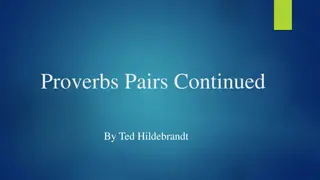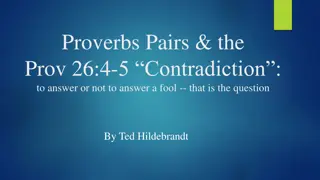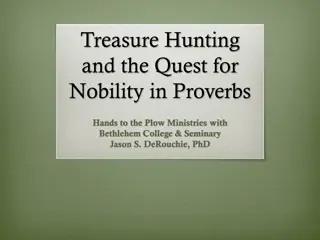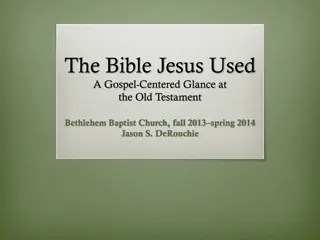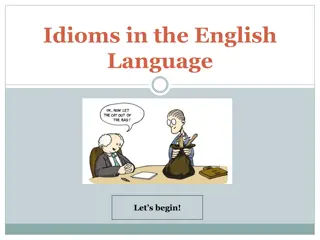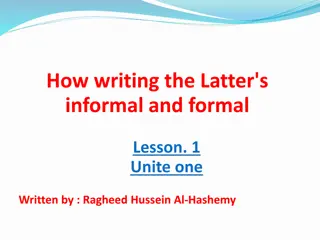Understanding the Significance of Proverbs and Idioms in Different Cultures
Explore the cultural and linguistic richness of proverbs and idioms, traditional sayings that convey wisdom and truths through metaphorical language. Discover the origins of proverbs, their prevalence in various cultures, and the complexity of interpreting them in different contexts.
Download Presentation

Please find below an Image/Link to download the presentation.
The content on the website is provided AS IS for your information and personal use only. It may not be sold, licensed, or shared on other websites without obtaining consent from the author. Download presentation by click this link. If you encounter any issues during the download, it is possible that the publisher has removed the file from their server.
E N D
Presentation Transcript
Proverbs A proverb (from Latin: proverbium) is a simple, concrete, traditional saying that expresses a perceived truth based on common sense or experience. Proverbs are often metaphorical and use formulaic language. Collectively, they form a genre of folklore. Some proverbs exist in more than one language because people borrow them from languages and cultures similar to theirs. In the West, the Bible (including, but not limited to the Book of Proverbs) and medieval Latin (aided by the work of Erasmus) have played a considerable role in distributing proverbs. However, almost every culture has its own unique proverbs.
Proverbs More constructively, Mieder has proposed the following definition, "A proverb is a short, generally known sentence of the folk which contains wisdom, truth, morals, and traditional views in a metaphorical, fixed, and memorizable form and which is handed down from generation to generation".
Proverbs Proverbs come from a variety of sources. Some are, indeed, the result of people pondering and crafting language, such as some by Confucius, Plato, Baltasar Graci n, etc. Others are taken from such diverse sources as poetry, stories, songs, commercials, advertisements, movies, literature, etc. A number of the well known sayings of Jesus, Shakespeare, and others have become proverbs, though they were original at the time of their creation, and many of these sayings were not seen as proverbs when they were first coined. Many proverbs are also based on stories, often the end of a story. For example, the proverb "Who will bell the cat?" is from the end of a story about the mice planning how to be safe from the cat.
Proverbs Some authors have created proverbs in their writings, such as J.R.R. Tolkien, and some of these proverbs have made their way into broader society. Similarly, C.S. Lewis' created proverb about a lobster in a pot, from the Chronicles of Narnia, has also gained currency. In cases like this, deliberately created proverbs for fictional societies have become proverbs in real societies. In a fictional story set in a real society, the movie Forrest Gump introduced "Life is like a box of chocolates" into broad society. Appeared in the 1994 film Forrest Gump, when the lead character Forrest Gump (played by Tom Hanks) says My mom always said life was like a box of chocolates. You never know what you're gonna get. Meaning: Life is full of surprises; you never know what will happen next.
Proverbs Interpreting proverbs is often complex, but is best done in a context. Interpreting proverbs from other cultures is much more difficult than interpreting proverbs in one's own culture. Even within English-speaking cultures, there is difference of opinion on how to interpret the proverb "A rolling stone gathers no moss." Some see it as condemning a person that keeps moving, seeing moss as a positive thing, such as profit; others see the proverb as praising people that keep moving and developing, seeing moss as a negative thing, such as negative habits.
Proverbs In English, for example, we find the following structures (in addition to others): Imperative, negative - Don't beat a dead horse. (Do not show a particular effort that is a waste of time as there will be no outcome Imperative, positive - If the shoe fits, wear it! (If a description fits, it is probably the case; if an insult accurately describes you, you must bear it; if you take offence at an insult that was only implicitly directed at you, you admit the insult is true enough to be recognizable) Parallel phrases - Garbage in, garbage out. (In computer science, garbage in, garbage out (GIGO) is the concept that flawed, or nonsense input data produces nonsense output or "garbage".)
Proverbs Rhetorical question - Is the Pope Catholic? (used to say that the answer to a question you have just been asked is obviously 'yes ) Declarative sentence - Birds of a feather flock together. Birds of a feather flock together has been around in the English language since the mid-1500s. When applied to people, this phrase means that people who are similar to each other or share similar interests tend to spend time with each other.
Usage of Proverbs Proverbs are used in conversation by adults more than children, partially because adults have learned more proverbs than children. Also, using proverbs well is a skill that is developed over years. Additionally, children have not mastered the patterns of metaphorical expression that are invoked in proverb use. Proverbs, because they are indirect, allow a speaker to disagree or give advice in a way that may be less offensive. Studying actual proverb use in conversation, however, is difficult since the researcher must wait for proverbs to happen
Usage of Proverbs Many authors have used proverbs in their writings, for a very wide variety of literary genres: epics, novels, poems, short stories. Probably the most famous user of proverbs in novels is J. R. R. Tolkien in his The Hobbit and The Lord of the Rings series. If you can only speak ill of those who showed you mercy, keep silent. Frodo Baggins Do not slay man or beast needlessly, & not gladly even when it is needed. Faramir One good turn deserves another. Frodo Baggins Many that live deserve death. And some that die deserve life. Gandalf
Usage of Proverbs Herman Melville is noted for creating proverbs in Moby Dick and in his poetry. Better to sleep with a sober cannibal than a drunk Christian. Ignorance is the parent of fear. Also, C. S. Lewis created a dozen proverbs He who has God and everything else has no more than he who has G od only. You don't have a soul. You are a Soul. You have a body.
Usage of Proverbs Similarly to other forms of literature, proverbs have also been used as important units of language in drama and films. Proverbs are often poetic in and of themselves, making them ideally suited for adapting into songs. Proverbs have been used in music from opera to country to hip-hop. In English the proverb (or rather the beginning of the proverb), If the shoe fits has been used as a title for three albums and five songs. Other English examples of using proverbs in music include Elvis Presley's Easy come, easy go, Harold Robe's Never swap horses when you're crossing a stream, Arthur Gillespie's Absence makes the heart grow fonder, Bob Dylan's Like a rolling stone, Cher's Apples don't fall far from the tree.
Usage of Proverbs Proverbs are frequently used in advertising, often in slightly modified form. Ford once advertised its Thunderbird with, "One drive is worth a thousand words" (Mieder 2004b: 84). This is doubly interesting since the underlying proverb behind this, "One picture is worth a thousand words," was originally introduced into the English proverb repertoire in an ad for televisions (Mieder 2004b: 83).
Usage of Proverbs A few of the many proverbs adapted and used in advertising include: "Live by the sauce, dine by the sauce" (Buffalo Wild Wings) "Live by the sword, die by the sword" is a proverb in the form of a parallel phrase, derived from the Gospel of Matthew (Matthew 26, 26:52) "At D & D Dogs, you can teach an old dog new tricks" (D & D Dogs) you can't teach an old dog new tricks used to say that a person who is old or is used to doing things in a certain way cannot learn or does not want to learn a new way "
Usage of Proverbs If at first you don't succeed, you're using the wrong equipment" (John Deere) If at First You Don t Succeed, Try, Try Again "A pfennig saved is a pfennig earned." (Volkswagen) Almost everyone has heard of this famous expression. Unlike many others, the origin of the idiom 'a penny saved is a penny earned' is well known it comes from Benjamin Franklin s book, Poor Richard s Almanack.
Counter Proverbs There are often proverbs that contradict each other, such as "Look before you leap" and "He who hesitates is lost", or "Many hands make light work" and "Too many cooks spoil the broth". These have been labeled "counter proverbs" or "antonymous proverbs". When there are such counter proverbs, each can be used in its own appropriate situation, and neither is intended to be a universal truth. Some pairs of proverbs are fully contradictory: A messy desk is a sign of intelligence and A neat desk is a sign of a sick mind . Game time
Anti Proverbs An anti-proverb or a perverb is the transformation of a standard proverb for humorous effect. Paremiologist Wolfgang Mieder defines them as "parodied, twisted, or fractured proverbs that reveal humorous or satirical speech play with traditional proverbial wisdom". Anti- proverbs are ancient, Aristophanes having used one in his play Peace, substituting 'bell' (in the unique compound "bellfinch") for 'bitch, female dog', twisting the standard and familiar "The hasty bitch gives birth to blind" to "The hasty bellfinch gives birth to blind" .
Aphorism An aphorism (from Greek : aphorismos, denoting 'delimitation', 'distinction', and 'definition') is a concise, terse, laconic, or memorable expression of a general truth or principle. They are often handed down by tradition from generation to generation. The concept is distinct from those of an adage, brocard, chiasmus, epigram, maxim (legal or philosophical), principle, proverb, and saying; some of these concepts are types of aphorism.
Laconic phrase A laconic phrase or laconism is a concise or terse statement, especially a blunt and elliptical rejoinder.[1][2] It is named after Laconia, the region of Greece including the city of Sparta, whose ancient inhabitants had a reputation for verbal austerity and were famous for their blunt and often pithy remarks..
Laconic phrase A witticism attributed to Lycurgus, the possibly legendary lawgiver of Sparta, was a response to a proposal to set up a democracy there: "Begin with your own family." On another occasion, Lycurgus was reportedly asked the reason for the less-than-extravagant size of Sparta's sacrifices to the gods. He replied, "So that we may always have something to offer." When he was consulted on how Spartans might best forestall invasion of their homeland, Lycurgus advised, "By remaining poor, and each man not desiring to possess more than his fellow." When asked whether it would be prudent to build a defensive wall enclosing the city, Lycurgus answered, "A city is well-fortified which has a wall of men instead of brick." (When another Spartan was later shown an Asian city with impressive fortifications, he remarked, "Fine quarters for women!)
Aphorism The word was first used in the Aphorisms of Hippocrates, a long series of propositions concerning the symptoms and diagnosis of disease and the art of healing and medicine. The often cited first sentence of this work is: " , " - "life is short, art is long", usually reversed in order (see Ars longa, vita brevis). This aphorism was later applied or adapted to physical science and then morphed into multifarious aphorisms of philosophy, morality, and literature. Currently an aphorism is generally understood to be a concise and eloquent statement of truth.
Aphorism Aphorisms are distinct from axioms: aphorisms generally originate from experience and custom, whereas axioms are self-evident truths and therefore require no additional proof. Aphorisms have been especially used in subjects to which no methodical or scientific treatment was originally applied, such as agriculture, medicine, jurisprudence and politics. A famous example is: Power tends to corrupt, and absolute power corrupts absolutely. Lord Acton
Brocard A brocard is a legal maxim in Latin that is, in a strict sense, derived from traditional legal authorities, even from ancient Rome. The word is a variant of the Latinized name of Burchard of Worms (died AD 1025), Bishop of Worms, Germany, who compiled 20 volumes of Ecclesiastical Rules.
Brocard Audi alteram partem or audiatur et altera pars "Listen to the other side", or "let the other side be heard as well". Refers to the idea that one cannot be fairly judged unless the cases for and against them have been heard. Cogitationis poenam nemo patitur "No one suffers punishment for mere intent." A crime is only committed through some act, not through a mere thought. Consensus facit legem "Consensus makes law". Stipulates that when two or more persons arrive at a good faith agreement, the law will insist on that agreement being carried out. Consuetudo pro lege servatur "Custom is held as law." Where no laws apply to a given situation, the customs of the place and time will have the force of law.
Famous Proverbs A stitch in time saves nine A little effort expended sooner to fix a small problem prevents it from becoming a larger problem requiring more effort to fix later. A little preparation can eliminate the need for repairs later. Ignorance is bliss Lack of knowledge results in happiness; it is more comfortable not to know certain things.
Famous Proverbs "Fortune favours the bold", "Fortune favours the brave" and "Fortune favours the strong" are common translations of a Latin proverb. (fortis Fortuna adiuvat) The slogan has been used historically by people in the military in the Anglosphere, and it is used up to the present on the coats of arms of individual families and clans. "An apple a day keeps the doctor away" is a common English-language proverb.
Famous Proverbs "Fortune favours the bold", "Fortune favours the brave" and "Fortune favours the strong" are common translations of a Latin proverb. (fortis Fortuna adiuvat) The slogan has been used historically by people in the military in the Anglosphere, and it is used up to the present on the coats of arms of individual families and clans. "An apple a day keeps the doctor away" is a common English-language proverb.
Famous Proverbs from Latin to English Abbati, medico, patrono que intima pande. English equivalent: Hide nothing from thy minister, physician and lawyer. Aegrescit medendo. English equivalent: The remedy is often worse than the disease; Burn not your house to rid it of the mouse. "Action taken to put something right is often more unpleasant or damaging than the original problem."
Famous Proverbs from Latin to English Diem vesper commendat. Translation: Celebrate the day when it is evening. Meaning: Don't celebrate until you are 100% sure there is a reason to do so.; Don't count your chickens before they're hatched. Dii facientes adiuvant. Translation: Gods help those who do. English equivalent: God helps them that help themselves. Meaning: "When in trouble first of all every one himself should do his best to improve his condition."
Famous Proverbs from Latin to English Ex nihilo nihil fit. Translation: "Nothing comes from nothing" (you need to work for something; also the Conservation Law in philosophy and modern science) (Lucretius). This is also a famous Shakespeare quote in King Lear. "If you would have any thing done for you, you must give something, for people will not serve you for nothing. Pax melior est quam iustissimum bellum. Translation: "Peace is better than the most just war. Proverb Quiz
Famous Proverbs from Latin to English Philosophum non facit barba. Translation: "A beard doesn't make a philosopher." (Plutarch) '"The educated don't get that way by memorizing facts; they get that way by respecting them. Quod nocet, saepe docet Translation: "That which harms, often teaches Meaning: Unpleasant experiences will make you wiser. English equivalent: What does not kill you makes you stronger. Si vis pacem, para iustitiam. Translation: "If you want peace, prepare justice."
Famous Proverbs from Latin to English Summum ius summa inuria. Translation: "More law, less justice." (Cicero, De officiis I, 10, 33) Suum cuique Pulchrum. Translation: To each its own is beautiful. English equivalent: The bird loves her own nest. Hominem unius libri timeo (meaning "I fear the man of a single book"). The phrase was in origin a dismissal of eclecticism, i.e. the "fear" is of the formidable intellectual opponent who has dedicated himself to and become a master in a single chosen discipline; however, the phrase today most often refers to the interpretation of expressing "fear" of the opinions of the illiterate man who has "only read a single book".
Idioms An idiom is a phrase or expression that typically presents a figurative, non-literal meaning attached to the phrase; but some phrases become figurative idioms while retaining the literal meaning of the phrase. Categorized as formulaic language, an idiom's figurative meaning is different from the literal meaning. Idioms occur frequently in all languages; in English alone there are an estimated twenty-five thousand idiomatic expressions. Color idioms quiz
Several Idioms Idiom Meaning Usage A blessing in disguise a good thing that seemed bad at first as part of a sentence A dime a dozen Something common as part of a sentence Beat around the bush Avoid saying what you mean, usually b ecause it is uncomfortable as part of a sentence Better late than never Better to arrive late than not to come a t all by itself Bite the bullet To get something over with because it i s inevitable as part of a sentence Break a leg Good luck by itself Call it a day Stop working on something as part of a sentence Cut somebody some slack Don't be so critical as part of a sentence Cutting corners Doing something poorly in order to sav e time or money as part of a sentence
Several Idioms Easy does it Slow down by itself Get out of hand Get out of control as part of a sentence Get something out of your system Do the thing you've been wanting to do so you can move on as part of a sentence Get your act together Work better or leave by itself Give someone the benefit of the d oubt Trust what someonesays as part of a sentence Go back to the drawing board Start over as part of a sentence Hang in there Don't give up by itself Hit the sack Go to sleep as part of a sentence
Several Idioms It's not rocket science It's not complicated by itself Let someone off the hook To not hold someone respon sible for something as part of a sentence Make a long story short Tell something briefly as part of a sentence Miss the boat It's too late as part of a sentence No pain, no gain You have to work for what y ou want by itself On the ball Doing a good job as part of a sentence Pull someone's leg To joke with someone as part of a sentence Pull yourself together Calm down by itself So far so good Things are going well so far by itself Speak of the devil The person we were just talki ng about showed up! by itself That's the last straw My patience has run out by itself
Several Idioms The best of both worlds An ideal situation as part of a sentence Time flies when you're having fun You don't notice how long somethin g lasts when it's fun by itself To get bent out of shape To get upset as part of a sentence To make matters worse Make a problem worse as part of a sentence Under the weather Sick as part of a sentence We'll cross that bridge when we com e to it Let's not talk about that problem rig ht now by itself Wrap your head around something Understand something complicated as part of a sentence You can say that again That's true, I agree by itself Your guess is as good as mine I have no idea by itself
References p. 5. Wolfgang Mieder. 1993. "The wit of one, and the wisdom of many: General thoughts on the nature of the proverb. Proverbs are never out of season: Popular wisdom in the modern age 3-40. Oxford University Press. p. 73. Neil Norrick. 1985. How Proverbs Mean: Semantic Studies in English Proverbs. Amsterdam: Mouton. Barbour, Frances M. "Some uncommon sources of proverbs." Midwest Folklore 13.2 (1963): 97-100. Korosh Hadissi. 2010. A Socio-Historical Approach to Poetic Origins of Persian Proverbs. Iranian Studies 43.5: 599-605. Thamen, Hla. 2000. Myanmar Proverbs in Myanmar and English. Yangon: Pattamya Ngamank Publishing. Doyle, Charles Clay, Wolfgang Mieder, Fred R. Shapiro. 2012. The Dictionary of Modern Proverbs. New Haven: Yale University Press. p. 68. Kent, Graeme. 1991. Aesop's Fables. Newmarket, UK: Brimax. Michael Stanton. 1996. Advice is a dangerous gift. Proverbium 13: 331-345 Trokhimenko, Olga. 2003. "If You Sit on the Doorstep Long Enough, You Will Think of Something": The Function of Proverbs in J. R. R. Tolkien's Hobbit." Proverbium (journal)20: 367-378. Peter Unseth. 2014. A created proverb in a novel becomes broadly used in society: " Easily in but not easily out', as the lobster said in his lobster pot." Crossroads: A Journal of English Studies online access Archived 2015-05-26 at the Wayback Machine p. 70, Winick, Stephen. 1998. The Proverb Process: Intertextuality and Proverbial Innovation in Popular Culture. University of Pennsylvania: PhD dissertation. Hawthorn, Jeremy, Ernest Bramah: Source of Ford Madox Ford s Chinese Proverb? Notes and Queries, 63.2 (2016), 286-288.
References Bryan, Geoerge. 2001. An unfinished List of Anglo-American Proverb Songs. Proverbium 18:15-56. Merriam-Webster's Dictionary of Synonyms, 1984, s.v. 'concise' p. 172. Henry Percy Smith, Synonyms Discriminated (1904) p. 541. Plutarch, Apophthegmata Laconica, 233e 1 2. The Animal Spirit Doctrine and the Origins of Neurophysiology, C.U.M. Smith, et al., Oxford University Press, 2012. Plutarch, De garrulitate, 17 1 2 or 3. Arrian, Anabasis Alexandri, I, 16, 7. Stuttard, David (14 October 2014). A History of Ancient Greece in Fifty Lives. Thames & Hudson. p. 88. ISBN 978- 0-500-77221-8. Belfield, Henry H. (1897). Lord Chesterfield's letters to his son and godson. Maynard, Merrill & Co. p. 48. ISBN 978-5871542569. supposed to be peculiar. The Oxford companion to the English language (1992:495f.) Jackendoff (1997).



